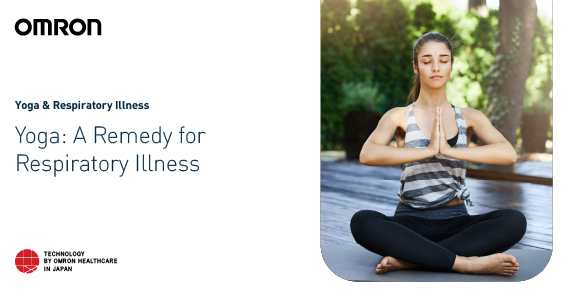Yoga: A Remedy for Respiratory Illness
May 23, 2024 2024-08-14 17:06Yoga: A Remedy for Respiratory Illness

Yoga: A Remedy for Respiratory Illness
Today, respiratory illness such as asthma and chronic obstructive pulmonary disease (COPD) are becoming more common. Pollution, smoking, sedentary lifestyle, and stress are just a few of the factors that greatly worsen respiratory health. Although traditional medical care is crucial, alternative therapies such as yoga are becoming increasingly recognized for their ability to reduce symptoms and enhance respiratory health in general. Yoga promotes relaxation, physical posture, and breath control, which aids in the treatment of respiratory disorders.
Understanding Respiratory Illnesses
Many ailments affecting the lungs and airways are included in respiratory diseases. The most common illnesses are asthma, which is defined as inflammation and constriction of the airways causing wheezing, shortness of breath, and coughing; COPD, which is a collection of lung diseases including emphysema and chronic bronchitis and result in blocked airflow and breathing difficulties; bronchitis, which is inflammation of the bronchial tubes frequently causes a persistent cough and mucus production; and pneumonia, which is an infection that causes inflammation of the air sacs in one or both lungs, results in cough with phlegm, fever, and troubled breathing. These illnesses need constant care and can have a major negative influence on quality of life. Yoga provides a comprehensive strategy for controlling respiratory health because of its emphasis on breath control, physical posture, and relaxation.
The Science Behind Yoga and Respiratory Health
An increasing amount of scientific data supports the advantages of yoga for respiratory health. The following are some important ways that yoga improves respiratory function:
Enhanced Lung Capacity: Yoga poses, especially the pranayama (breathing exercises), improve the efficiency and capacity of the lungs. Breathing exercises such as diaphragmatic and deep breathing, strengthen the respiratory muscles and promote complete oxygen exchange.
Decreased Inflammation: Airway inflammation is frequently a symptom of chronic respiratory diseases. Yoga’s stress-relieving advantages lower cortisol and other stress hormones, potentially reducing systemic inflammation.
Improved Oxygen Utilization: Consistent yoga practice helps the body use oxygen more effectively. This is important for those who have respiratory disorders since it can help reduce symptoms like exhaustion and shortness of breath.
Stress Reduction: The loop of stress and respiratory discomfort can be broken by practicing yoga, which enhances relaxation and mental health. Stress worsens several respiratory disorders.
Yoga Practices for Respiratory Health
Several specific yoga postures are particularly beneficial for individuals with respiratory illnesses:
Pranayama (Breathing Exercises):
- Diaphragmatic Breathing: Also known as belly breathing, this technique encourages deep breathing by engaging the diaphragm, allowing for full oxygen exchange.
- Nadi Shodhana (Alternate Nostril Breathing): This practice balances the nervous system and enhances respiratory function by promoting even controlled breathing.
- Kapalabhati (Skull Shining Breath): A vigorous breathing technique that helps clear the airways and strengthen the respiratory system.
- Ujjayi (Ocean Breath): This technique involves breathing through the nose with a slight constriction in the throat, creating a soothing sound and enhancing breath control.
Asanas (Physical Postures):
- Bhujangasana (Cobra Pose): This posture opens the chest and lungs, improving breathing capacity and alleviating congestion.
- Setu Bandhasana (Bridge Pose): This pose stretches the chest, lungs, and abdomen, enhancing respiratory function and reducing stress.
- Adho Mukha Svanasana (Downward-Facing Dog): This posture helps open the chest and lungs, promoting deeper breathing and better oxygenation.
- Ardha Matsyendrasana (Half Spinal Twist): Twisting postures aid in detoxifying the lungs and improving their function by enhancing blood flow.
Meditation and Relaxation:
- Yoga Nidra (Yogic Sleep): A deep relaxation practice that helps reduce stress and improve respiratory efficiency.
- Mindfulness Meditation: Focusing on breath and cultivating mindfulness can alleviate anxiety and improve overall respiratory health.
Incorporating Yoga into Your Routine
Consistency is essential for using yoga as a treatment for respiratory illnesses. To guarantee safety and effectiveness, expert advice is highly recommended, particularly for novices or individuals with severe respiratory diseases. Incorporate yoga into your everyday routine little by little, starting with easy poses and breathing techniques. Over time, consistent practice-even for a short while each day-can result in noticeable gains in respiratory health. It’s critical to pay attention to your body, refrain from overexerting yourself, and adjust postures to your comfort level as necessary. Yoga should be used in addition to traditional medical therapies, not as a substitute for them. As such, before beginning any new fitness program, always check with your healthcare professional.
Conclusion
Yoga is a comprehensive, approachable, and successful method of treating respiratory ailments. Yoga improves respiratory health and general well-being by increasing lung capacity, lowering inflammation, and promoting relaxation through asanas, pranayama, and meditation. You may improve your quality of life and respiratory health by proactively including yoga into your practice.






